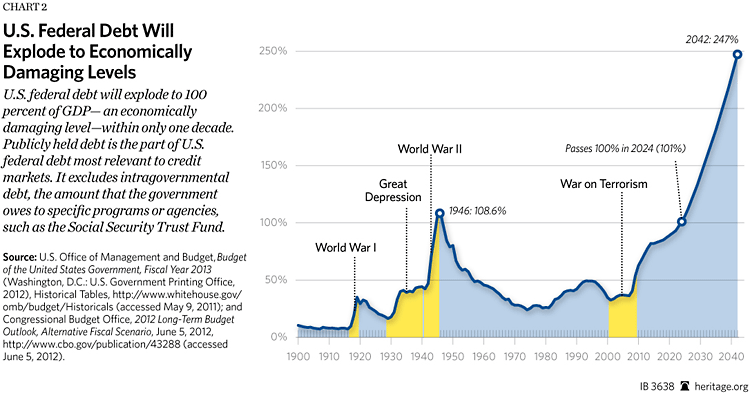Causes and Consequences of the National Debt
Post on: 10 Сентябрь, 2015 No Comment

Essay by:
Brandon Rich
Emporia State University
The Face-up Challenge The budget should be balanced; the treasury should be refilled; public debt should be reduced; and the arrogance of public officials should be controlled. -Cicero. 106-43 B.C.
In order to explain the causes of the ever rising United States national debt, one must first understand what comprises the debt. To put it in the simplest phrase possible, the national debt is the accumulated amount of money which is owed by the federal government. Another factor that coincides with the national debt is the federal deficit which is the yearly expenses which exceed the revenue. In order to figure the national debt, one must add all the U.S deficits we have had throughout our nation’s history, including both the small amount of surpluses we have had and growing interest on the net borrowing, and the result will equal the national debt. Most will have a concern over our nation’s economic perils after they first gain an understanding of what factors comprise our current economic turmoil. Once we have a basic understanding, concerned citizens may make educated suggestions of how we could scratch a few zeros off the national debt clock in Times Square.
An elementary understanding begins with the entities and nations to whom we owe money and also how large of an amount to we owe. If the national debt was an apple pie that was to be split up amongst party members, the largest portion (forty percent) would be served to the Federal Reserve. The remaining sixty percent would be randomly distributed to private individuals, such as Warren Buffet, corporations, and states as well as foreign governments. Japan and the U.S have the closest reliance on one another as far as economic means are concerned. The U.S. currently owes Japan more than half a trillion dollars. The other major non-domestic holders of our national debt are China and the United Kingdom to whom we each owe about half the amount we owe Japan. The remaining debt-holders include: private pensions and mutual fund holders, commercial banks, savings and loan associations, credit unions, individual U.S savings bonds holders, insurance companies, and a variety of others. About seventy-eight percent of our national debt is owed to domestic companies or government factions and the rest is owed to foreign governments or businesses. By recognizing who those to we owe trillions of dollars too, people will gain a better understanding of what causes the debt to continually rise at an alarming rate.

An interesting tool to acknowledge how drastically the debt grows not only on a monthly or yearly scale, but by an hourly rate is to compare our current statistics to the ones we had when our nation was still in an infancy stage. In January of 1791, the U.S national debt was a mere seventy-five million dollars. Seventy-five million dollars is a massive amount of money to anyone, but in comparison to current statistics, it is minute. As of February 2008, the debt rises at roughly seventy-five million dollars per hour.
As the debt continues to rise at unprecedented amounts, and even more drastically in the recent months in which the Federal Government spent nearly 700 billion dollars in an attempt to bail out banks that went belly up, we must evaluate the consequences these expenditures may cause in the near future. There is also concern the government may be forced to bail out the American auto industry which has seen its production numbers dwindle to daunting lows. The amount of money that may be required to revitalize the auto industry would most likely be in the double or triple digits of billions. The backlash this massive spending may and most likely will cause to the overall American economy could be catastrophic. If banks cannot continue to grant loans to people who are wishing to purchase a house, car, or start a business, then money will not circulate back into the economy. If the government continues to keep lending money to foreign investors and bailing out multi-billion dollar businesses that do not produce instead of focusing more on domestic issues and small businesses that the economy will continue to suffer and eventually more and more people will be put out of work.
If extra number slots routinely need to be added to the debt clock in Times Square (and they will) and the federal government continues to spend hundreds of billions of dollars to bail out billion-dollar corporations who cannot meet their own standards, then the American economy will likely only continue to dwindle. Government officials and CEOs must focus more time and effort on the economy and the American work force that they once did in order to revitalize the economy. By providing jobs and offering incentives to employees whom will funnel money back into the economy, we will slowly begin to level out the deficit, and hopefully someday we will be able breathe a little easier when the subject of government spending and debt is concerned. Andrew Jackson is the only American president who is credited as having the national debt at zero. In actuality, the debt was a few thousand dollars, but even by those standards everyone would prefer we experience an administration that Americans had under Jackson.
The best conclusion is for concerned citizen to gaining a deeper knowledge of the national debt. They could call or write elected U.S Senators and/or State Representatives and plainly ask them what steps they are taking to reduce the national debt. For significantly reducing the debt, the task does not rest solely on one or even a few individuals but as a massive organized and cooperative effort. Then there is hope of scratching a few zeros off that famous clock as we learn to accept the sacrifices necessary to ensure a brighter future.














